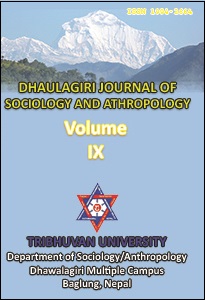Auto/ethnography: A Transformative Research Paradigm
DOI:
https://doi.org/10.3126/dsaj.v9i0.14027Keywords:
Auto/ethnography, transformative learning, paradigm shift, multiple logics and generesAbstract
This paper aims to address the key question, ‘How far autoethnography contributes towards enriching the field of transformative learning?’ Using my lived experiences as a teacher educator/autoethnographer/researcher and contextualizing self/others within a particular socio-pedagogical life courses I build the basis through addressing questions: Why auto/ethnography is one of the most suitable spaces for transformative researchers and to what extent it serves the agenda of envisioning a transformative teacher education. To achieve this objective I use autobiographies, stories, reflections and poems etc. as narratives with multiple logics and genres; pictography as art-based expression; and ethnography as methodological space within multiparadigmatic design space. In so doing autoethnographer has to delve into whole process of research along a continuum of self and beyond within a particular sociocultural context to understand the phenomena at deeper level of consciousness. This transformative paradigm holds a strong basis in the process of research as: re/reading, re/viewing, critically reflecting on self/others, re/writing for meaning making and developing a subjective understanding of phenomena under exploration. This process of research is found to be an innovative way of knowing through ‘interpreting and constructing (Luitel, 2009)within Interpretivism, critically thinking and reflecting within Criticalism, and adding both ‘pluralism and playfulness’ (Taylor, 2013) within Postmodernism. In so doing it raises awareness, develops consciousness and improves capacities constantly that ultimately alters our way of seeing and being in the world differently- a paradigm shift in self/others. It is found to be highly rigorous, dialectically eloquent, dialogically rigorous, critically reflective, consciously awakening, and innovative critical discourse that greatly contributes to transform researcher/s. Therefore, it seems illustrious for teacher educators/teachers to embrace this paradigm in order to foster their transformative learning so that to transform self/others.Downloads
Download data is not yet available.
Abstract
3867
PDF
5844
Downloads
Published
2015-12-07
How to Cite
Qutoshi, S. B. (2015). Auto/ethnography: A Transformative Research Paradigm. Dhaulagiri Journal of Sociology and Anthropology, 9, 161–190. https://doi.org/10.3126/dsaj.v9i0.14027
Issue
Section
Articles




